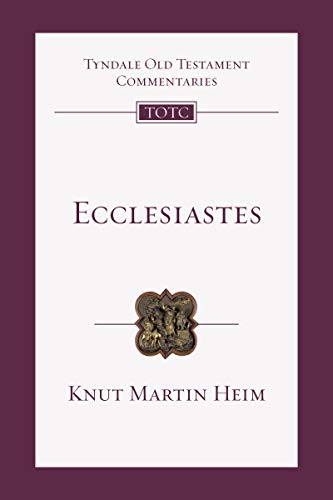A Book Review from Books At a Glance
by B. Jason Epps
Heim is a professor of Old Testament at Denver Seminary. The table of contents in this commentary breaks down the specific sections of the introduction. Outside the introduction, however, there is no subdividing of the table of contents. Like all the Tyndale commentaries, it includes a select bibliography for readers to perform deeper research.
Heim refers to Ecclesiastes throughout this commentary as Qoheleth, the name used for it in the Hebrew canon. Regarding Ecclesiastes’ authorship, Heim acknowledges the prevailing view of Solomon, but asserts that the author of Ecclesiastes, or Qoheleth, is not Solomon, but rather an orator of the assembly.
He notes that both Jews and Christians have struggled to utilize and apply the book of Ecclesiastes. In order to combat this, he puts forth the idea that Ecclesiastes is political satire. He argues that Ecclesiastes has a secret message against the political powers of the Ptolemaic Egyptian empire. As such, he places Ecclesiastes in the third century BC. His argument that Ecclesiastes is a political satire is interesting, but is unconvincing and seems circular, primarily resting on his historical reconstruction. His argument also seems circular. He reads political nuances into phrases like “under the sun” because he sees these phrases as speaking to political reality. He sees the political reality because of these phrases. However, the language in this book seems to communicate general statements about life and the world. His ultimate conclusion about Ecclesiastes, however, namely that believers are to stay true to God in spite of life’s difficulties, seems to be very similar to the standard interpretation of “without God, everything is meaningless, so trust and rely on Him.”
He sees Ecclesiastes structured as one continuous speech, bookended by the phrase “everything is meaningless.” Because he sees Ecclesiastes as political satire and as a speech, Heim sees Ecclesiastes as similar to a Greek comedy, where the harsh statements in Ecclesiastes are meant to be read with a sense of humor behind them. This again seems to stem from his overemphasis on background recreation and also seems to distract from one of the main points of the book, which is that everything is meaningless without God. Seeing Ecclesiastes as comedic political satire resolves for Heim the scholastic tension of whether the author is orthodox or skeptical. While I admire Heim’s attempt to resolve this issue in a creative way, this does not seem to be a major concern of the book of Ecclesiastes itself because the book of Ecclesiastes ultimately rests on the preeminence of obeying and following God.
An interesting feature of this commentary is that Heim provides a fresh translation of the entire book of Ecclesiastes with no chapter or verse markings. He clarifies and highlights wordplay within Ecclesiastes, which can be inordinately helpful. He then provides an outline of the book to orient readers.
In the commentary proper, he separates small sections of Ecclesiastes into chapter divisions. He provides within the chapter title a summation of the unit. Occasionally, if he is dealing with a larger section of Scripture in the commentary, he creates a further subdivision. In his commentary, before analyzing particular verses, he connects each section to the whole of Ecclesiastes. In his commentary proper, he has comments on almost every verse in Ecclesiastes. He sometimes even analyzes half of a verse. He regularly engages with scholarship, showing the history of interpretation with Ecclesiastes. It is not surprising that throughout the commentary proper that his analysis of Ecclesiastes as political satire comes to the forefront. When dealing with the issue of Solomonic authorship, Heim sometimes addresses the issue in some verses, but quickly dismisses the prospect.
While at times this commentary has technical Hebrew discussions, they are presented in such a way as to be understandable to the average reader. As such, this commentary can be useful for any layperson or student. The major weakness to this commentary is its reliance on the reconstruction of the historical background of the text. While Heim intended to elevate Ecclesiastes’ pride of place among Christians, practically the result seems to subtract from general principles of life.
Jason Epps
Midwestern Baptist Theological Seminary
